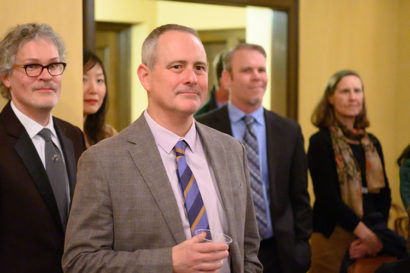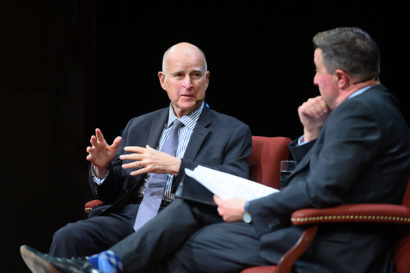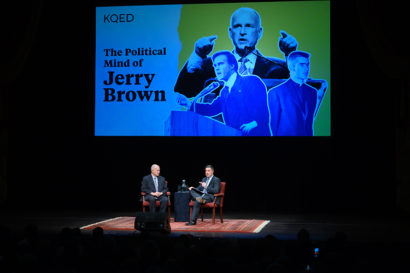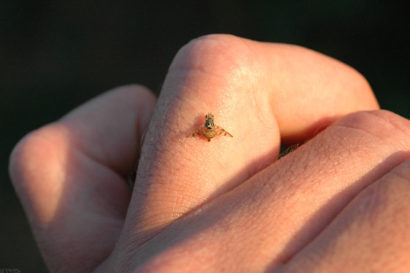Berkeley oral history project reveals ‘20 shades of Jerry Brown’
UC Berkeley's Oral History Center and KQED teamed up to record the longest interview Brown has ever done — one that offers a first-person account of his nearly five decades in California politics
January 21, 2020
UC Berkeley’s Oral History Center and KQED teamed up to record the longest interview that Jerry Brown has ever done — one that offers a first-person account of his nearly five decades in California politics. For 20 sessions, they sat at Brown’s dining room table at his ranch in Colusa County and asked him about everything from what it is was like having a father in politics to dating singer Linda Ronstadt to his views on politics today.

Official state portrait of Edmund G. “Jerry” Brown, Jr., completed in March 1984 by Los Angeles artist Don Bachardy a year after Brown served as the 34th governor of California. (Painting from the Center for Sacramento History photo collection via Calisphere)
Read a transcript of Fiat Vox episode #63: Berkeley oral history project reveals ‘20 shades of Jerry Brown’:
Narration: Since Martin Meeker joined UC Berkeley’s Oral History Center in 2004, he’s wanted to interview Jerry Brown.
[Music: “Secret Pocketbook” by Blue Dot Sessions]
Meeker first became aware of Brown as a kid growing up in the South Bay. It was 1981, and Brown was the governor of California.
[Clip: ABC news report, Jan. 6, 1981: There’s another national economic story today. It concerns a tiny insect which is threatening the health of California’s multibillion-dollar agricultural industry …]
Mediterranean fruit flies had begun to infest crops in Northern California and threaten the state’s agricultural industry, which produced about half of the nation’s fresh fruit and vegetables. Brown had to decide whether or not to authorize widespread aerial spraying of the insecticide malathion.
[Music fades down]
Many Californians and environmentalists worried that it would be unhealthy for children and other living things. Growers and state legislators wanted a quick solution to the infestation. Officials insisted that malathion had little toxicity for humans.
Although he knew that spraying would make his popularity plummet, Brown eventually decided to authorize it.
[Clip: KTLX news report, 1981: Four malathion-spraying helicopters took to the sky over San Jose this morning in the continuing battle, of course, against the Medfly …]
Meeker recalls when it happened.
Martin Meeker: As a kid, I remember the helicopters flying over our backyard spraying malathion. It looked kind of like Apocalypse Now. And, you know, we stayed inside. The stuff came down. It made the cars a little sticky, but there doesn’t seem to have been any long-term negative impacts from it.
Narration: A lot of people weren’t happy with the decision, and many believe it cost Brown a seat in the U.S. Senate the following year.
[Music fades up: “Secret Pocketbook” by Blue Dot Sessions]
Since then, Brown has stayed on Meeker’s radar as a unique politician who refused to be put into a category.
Just last year, Meeker, now the director of the Bancroft Library’s Oral History Center, finally got the chance to interview Brown as part of a joint project between the Oral History Center and KQED.
What came from it was the longest, most in-depth interview that Jerry Brown has ever given — one that offers a first-person account of his five decades in California politics.
This is Fiat Vox, a Berkeley News podcast. I’m Anne Brice.
[Music fades down]

Jerry Brown being interviewed by the Oral History Center’s Martin Meeker and Todd Holmes (right) and KQED’s Scott Schafer. The team spent 40 hours in 20 sessions interviewing Brown. The full transcript of the interview is available on the Oral History Center’s website. (Center for Sacramento History photo)
Narration: A UC Berkeley alumnus, Brown has served as the 34th and 39th governor of California. He just finished his fourth term last year. He’s been the mayor of Oakland, California’s attorney general and has served as the chair of the California Democratic Party. He’s lost a race for the Senate and has run unsuccessfully for president three times — in 1976, 1980 and 1992.
During the past year, Meeker, along with his colleague from the Oral History Center, Todd Holmes, and KQED’s Scott Schafer, spent more than 40 hours interviewing Brown.
Meeker says that during the interview he grew even more interested in how Brown makes his own decisions and doesn’t fit neatly into one political party.
Martin Meeker: He sees himself more as a tribal Democrat, rather than as somebody who is a part of the Democratic Party because of a set of policies or overarching ideology. Sometimes we would see that he runs to the left of Democratic Party policy. Sometimes he runs to the right of it. And sometimes, he operates on a different plane altogether.
Narration: For instance, Brown believes in limited government spending and is against using nuclear power. Here’s Brown:

Martin Meeker, director of the Bancroft Library’s Oral History Center at UC Berkeley, says his favorite parts of the 40-hour interview with Jerry Brown were when Brown talked about his philosophy on politics and governance. (Photo by Alain McLaughlin courtesy of KQED)
Jerry Brown: … The small mind does a, “Ooh, you don’t want to overspend. You’re a Republican.” Or, “Oh, you don’t like nuclear power, well you’re a liberal, you’re a Democrat,” or something. So you put the two together, and that creates a certain cognitive dissonance.
[Music: “The Crisper” by Blue Dot Sessions]
Narration: For 20 sessions, the team sat at Brown’s dining room table at his ranch in Colusa County — one that’s entirely off the power grid — and asked him about everything from what it is was like having family in politics to dating singer Linda Ronstadt to his views on politics today.
Here he is talking about his father, Edmund G. “Pat” Brown, who served as the 32nd governor of California.
[Music fades down]
Jerry Brown: There were just different issues. I don’t think the word “environment” existed when my father was governor. Earth Day was 1970. He lost to Reagan in November of ’66, so a lot of things have changed.
It was just a different sensibility, and it’s hard to compare. But I was very conscious of the fact that I had the same name as my father. Without that, I was nothing, and I didn’t mind that. My whole life I’ve benefited from … my father’s achievements. No question about it.
Narration: And although Brown didn’t go into a lot of detail about dating singer Linda Ronstadt, he touched on the decade the couple dated starting in the early 1970s, and talked about why people were so curious about them.
Jerry Brown: She was interesting, I was interesting — the two of us were more interesting. That’s all. It’s a combination — how you put politics in rock and roll, and that was the mood at the time.
Narration: On the state of politics today, he said a lot needs to change and it’ll continue to be an uphill battle that’s worth fighting.
Jerry Brown: The country started on another basis. We had an electoral — we had property owners, male property owners. That was a very small slice of American humanity. That’s the way it worked. We also had slaves, and we were also taking the land of the Indians. And then later, we took half of Mexico. And women were not voting then.

Meeker says that during the interview, Brown’s philosophy would sometimes come out in pithy phrases, like, “You have to make as much news as you can that’s favorable, in as many media markets, as often as you can.” Other times, says Meeker, Brown would spend 20 minutes responding with “an extraordinarily detailed, thoughtful, self-critical, broad, sweeping answer.” (Photo by Alain McLaughlin courtesy of KQED)
So, now we’ve come to a mass electorate, with mass propaganda and mass communication, and there it is. Well, we’ll see. We’ll see in the next 10 or 20 years how it all turns out. I hope it turns out OK. I hope for the best, but fear the worst.
[Music: “Lakeside Path” by Blue Dot Sessions]
Narration: But to Meeker, perhaps the most interesting parts of the interview were when Brown talked about his philosophy on politics and governance.
Martin Meeker: His philosophy comes out both in the pithy phrases that he sometimes offers and then, also, in these longer reflections. So, h e says things like:
Jerry Brown: You have to make as much news as you can that’s favorable, in as many media markets, as often as you can.
Martin Meeker: He’s very aware of the necessity of a narrative, and he’s careful to construct that narrative. Not make something up, but think about the context.
[Music fades down]
Narration: Other times, says Meeker, they would ask Brown a question, like:
Scott Shafer: So, Miriam Pawel, in her book, writes that you delivered your inaugural address on statewide television sounding more like a Republican candidate than a Democratic governor. What is your response to that characterization?
Martin Meeker: … and for the next 20 minutes, he would close his eyes and offer an extraordinarily detailed, thoughtful, self-critical, broad, sweeping answer.
[Music: “Fern and Andy” by Blue Dot Sessions]
We had 20 interview sessions, and I would say that in those 20 interview sessions, we had 20 different shades of Jerry Brown.
Narration: To experience all 20 shades, you can now read the full transcript of the 40-hour interview on the Oral History Center’s website.

Brown and Schafer at a KQED event promoting the station’s new podcast, The Political Mind of Jerry Brown. (Photo by Alain McLaughlin courtesy of KQED)
The interview marks the first in the relaunch of the California State Government Oral History Project sponsored by the California State Archives.
And KQED just released an eight-episode podcast produced from the interviews called The Political Mind of Jerry Brown. You can listen to the full season of the podcast on KQED’s website.
For Berkeley News, I’m Anne Brice.
You can subscribe to this podcast, Fiat Vox, on Apple Podcasts or wherever you listen. If you liked this episode, consider sharing it with a friend. And check out our other podcast, Berkeley Talks, that features lectures and conversations at UC Berkeley. You can find all of our podcast episodes on Berkeley News at news.berkeley.edu/podcasts.
